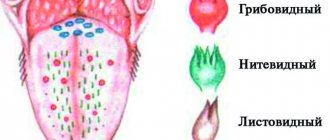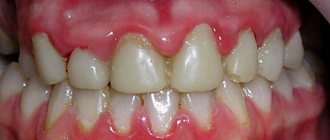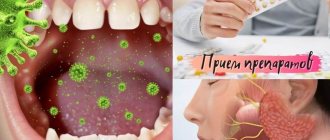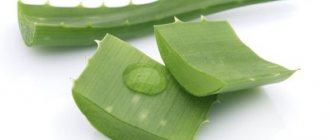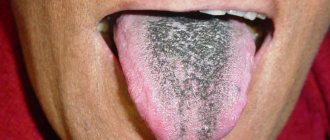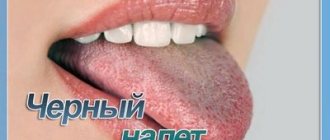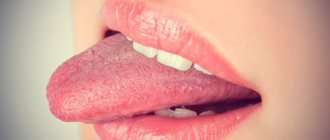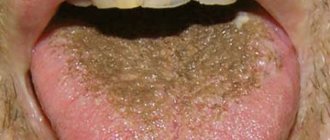Plaque on the tongue itself is not a disease, it is a symptom that reflects what is happening in the body. There are types of plaque on the tongue that indicate a disorder in the functioning of internal organs. These types of plaque are called pathological.
Author:
- Sadykhov Rahim Agalarovich
ENT pathology expert
3.64 (Votes: 14)
Plaque on the tongue itself is not a disease, it is a symptom that reflects what is happening in the body. In this regard, the statement that language is a mirror of our health is quite true. A slight transparent or whitish coating is normal for a healthy adult. It is usually noticeable after sleep and can be easily cleaned with a toothbrush. However, there are other types of plaque that are not so harmless and indicate a disorder in the functioning of internal organs. These are pathological types.
Pathological plaque can be different: the color ranges from thick white to black, dense and sticky in consistency, and has a bad odor. The structure of the language itself may also change. This is the first signal about the onset of the disease, so if you notice uncharacteristic changes in the appearance of your tongue, consult a doctor for a correct diagnosis. Indeed, in this case it is necessary to identify the root cause of this unpleasant manifestation and quickly begin to treat the underlying disease.
Plaque on the tongue: normal or not?
The human language is a kind of litmus test for the health of the entire organism. Normally, a healthy person should have a tongue without plaque, but this is ideal, which is rare today. If the tongue is coated, there are only two cases where you should not worry about it.
- After meal.
Eating foods such as strong tea, black coffee, red wine, blueberries, and beets causes temporary staining of the tongue and an unnatural coating on it, but both phenomena go away on their own and do not cause damage to health. - After the night.
A constant coating on the tongue in the morning is normal. At night, bacteria living in the mouth actively multiply, leaving traces of their vital activity. A thorough morning toilet will put everything in its place.
Tongue care kit from miradent.
Using rinse aids
You can use rinses to clean your tongue only in conjunction with all other hygiene procedures. The choice depends on the condition of the gums and teeth:
- For loose, bleeding gums, you need to choose a rinse with a high content of fluoride and oak bark extracts.
- Coniferous tree extracts included in the mouthwash thoroughly sanitize the oral cavity, destroying bacteria.
- Zinc chloride, which is part of the mouthwash, helps keep teeth white and prevent the formation of tartar.
Using mouthwash ensures fresh breath.
Colloidal silver is a natural antiseptic
It is advisable to have colloidal silver in your home medicine cabinet, which is an excellent antiseptic and antibiotic. It destroys bacteria, fungi, and viral infections.
It can be used to treat your hands, mouth, and even be taken orally. The product is a suspension of silver microparticles in distilled water. They treat wounds with it, and rinse the mouth with the solution for any problems with the oral cavity, including plaque on the tongue.
Propolis tincture to cleanse the tongue
Propolis tincture, which can be purchased at any pharmacy, does an excellent job of sanitizing the oral cavity. It is used:
- for rinsing - prepare a solution at the rate of 15 ml of tincture per 100 ml of water and rinse your mouth after each meal;
- to clean the tongue - use undiluted tincture, apply to a tampon and clean the tongue from root to tip, changing the tampon each time.
Before you start cleaning with propolis tincture, you should test for an allergic reaction. Use a cotton swab soaked in the solution to clean a very small area of your tongue. Wait at least 12 hours for the reaction. If no manifestations of allergies occur, then you can clean the surface of the entire tongue.
Herbal decoctions to get rid of plaque on the tongue
Using herbal decoctions to sanitize the oral cavity is a great idea. But it is unreasonable to expect that simply rinsing will get rid of plaque on the tongue. Decoctions of medicinal herbs should only be used in combination with other cleaning methods. Herbal decoctions are ideal for rinsing the mouth:
- from oak bark;
- calendula;
- sage;
- chamomile;
- peppermint;
- lemon balm.
It is not difficult to prepare such a decoction:
- Buy a herbal mixture or use a monocomposition at the rate of 1 teaspoon of herbs or herbal mixture per 100 ml of water.
- Pour boiling water over it and leave over low heat, avoiding boiling, for 10–15 minutes.
- Cool and strain.
The decoction can be used to rinse your mouth after mechanical sanitation.
Method of mechanical tongue cleaning
Mechanical methods of getting rid of plaque on the tongue include:
- cleaning with the grooved side of a toothbrush or a special brush;
- the same action using a special scraper in the form of a plastic ring;
- cleansing with a teaspoon or a special scraper that resembles one.
The method of application is simple - you need to scrape off the plaque from root to tip, each time rinsing the scraper under running water.
The main thing here is not to overdo it. Do not press too hard on the tongue to avoid damaging the papillae and causing bleeding. After mechanical cleaning, be sure to rinse your mouth with a decoction of herbs, mouthwash or colloidal silver solution.
Cleansing the mouth with vegetable oil
This method of cleansing the oral cavity from any infectious lesions was known to our forefathers. It will help not only get rid of plaque, but also solve problems with caries, periodontal disease, and gingivitis. There are no contraindications for it, and the benefits will be obvious after the first procedure. The essence of the method is as follows:
- In the morning on an empty stomach or in the evening, 3 hours after the last meal, take 1 tbsp into your mouth. a spoonful of unrefined vegetable oil.
- Next, for 10 minutes, you need to rinse your mouth with this oil through closed teeth, without swallowing it.
- Ideally, the oil should turn white or dirty gray depending on your health.
- The oil is spat out, and the mouth is rinsed with water or herbal decoctions.
This procedure brings tangible results - bad breath disappears, plaque disappears, gums become stronger, and teeth become healthy and shiny. General well-being improves.
How to use saline or soda solution
You can also use a saline or soda solution only in combination. This procedure alone will not bring the desired result. But this solution is quite suitable as a rinse.
It is enough to dissolve 1 teaspoon of soda or ½ teaspoon of salt in 200 ml of boiled water, cool to room temperature and rinse the mouth after mechanical cleansing of plaque.
You shouldn't self-diagnose. If you have any suspicious symptoms, consult a specialist.
What if it's a disease?
A strong coating on the tongue and bad breath are already a reason to be wary. An experienced doctor will determine which disease the plaque on the tongue is a sign of, comparing the degree of density of the deposit, color and location.
Glossitis
One of the typical diseases characterized by plaque on the tongue is glossitis - inflammation of the tongue caused by injury or of an infectious nature. With glossitis, red spots appear on the tongue, which is why the disease is sometimes called “geographic tongue.” Read more in the article.
Gastritis
If your mouth is sour and there is a coating on your tongue, this is a sign of inflammation of the gastric mucosa. Usually the plaque disappears if you follow a diet.
Thrush
With thrush, the plaque is located under the tongue. It is distributed unevenly and has the character of spots.
Chlamydia
With chlamydia, a sexually transmitted disease, a thick, sticky coating appears on the roof of the mouth and tongue as a result of a malfunction in the immune system after an attack by chlamydia.
Bronchitis and pneumonia
Plaque on the sides of the tongue will indicate an upper respiratory tract disease. In most cases, it is whitish and is easily removed by brushing your teeth and tongue, but also quickly returns to its original place.
Alcoholism
A coating on the tongue after alcohol abuse is common. People talk about this figuratively: “It’s like cats have shit in your mouth.” However, in chronic alcoholics, the dark brown coating never goes away and is localized at the root of the tongue.
Cancer
If the tongue is coated, one cannot say with certainty that a specific type of cancer is present. But it is precisely this symptom, coupled with a number of other characteristics, that indicates a complication of an oncological disease (for example, a malignant tumor in the lungs).
Plaque on the tongue of a pregnant woman, with rare exceptions, is not a sign of illness - it is the result of changes in hormonal levels.
Prevention
Dark spots on the tongue will never bother you if you follow the following rules and recommendations:
- Minimize the consumption of spicy, fatty, carbonated water, coffee.
- Maintain good oral hygiene. In addition to teeth, clean the inside of your cheeks, gums, and tongue. Teach children to this. Use plant extracts for rinsing. Don't skimp on toothpaste.
- Get rid of bad habits: smoking and alcohol abuse.
- When treating with antibacterial compounds, strictly follow medical recommendations.
- Expand the amount of physical activity in accordance with age and health status.
- Add bran, fruits, and vegetables to the menu. Nutritious smoothies are beneficial. Instead of black tea, drink mint, strawberry, linden or other herbal tea.
- If you are prone to sore throat, try not to injure the mucous membrane of the throat, for which purpose eat dishes in the form of puree. Inhalation is carried out using sea buckthorn or fir oil.
- If a child’s tongue turns black, consult a pediatrician to find out what new food triggered such a symptom, so that you can then help the child adapt painlessly. Treatment methods for children do not differ from those for adults. Great care and smaller dosages will be required, as determined by your doctor.
- Baby food should be natural and consist of fresh products. On the recommendation and under the supervision of a pediatrician, vitamin and mineral complexes can be given to the child to strengthen the immune system.
Do not practice self-medication, which rarely ends well. If the condition worsens, immediately contact a doctor. Regularly visit an ENT doctor, dentist and other specialists for preventive purposes. Bitter salt for cleansing the intestines, you can find out at the link.
Main causes of plaque
- Infection.
The main cause of plaque on the tongue in adults is infectious diseases, characterized by the uncontrolled proliferation of pathogenic microorganisms. - Impaired immune function.
When the body's protective barrier cracks, this serves as a catalyst for the activation of pathogenic bacteria, which usually occurs against the background of an increase in body temperature. - Gastrointestinal pathologies.
Various chronic ailments of the gastrointestinal tract caused by Helicobacter. Plaque on the tongue due to gastritis, if the disease is not treated, becomes denser over time and provokes bad breath. A clear sign of enterocolitis in adults is considered to be plaque on the root of the tongue. - Side effect of drugs.
Plaque on the tongue after antibiotic treatment is a common phenomenon. Medicines that include substances that inhibit the growth of certain pathogenic bacteria negatively affect the acid-base balance in the mouth, which entails an increase in the number of microorganisms “responsible” for the appearance of plaque. - The consequences of nicotine.
If you are an “experienced” smoker, then you shouldn’t be surprised by a gray or yellow coating on your tongue. Nicotine abuse has a detrimental effect on the microflora of the body in general and the oral cavity in particular.
Attention!
A provoking factor for the appearance of plaque on the tongue is also helminthic infestations, such as giardiasis. For differential diagnosis in this situation, it is necessary to take a stool test for helminth eggs.
What does plaque color tell you?
White
As we have already said, a thin white mucous coating on the tongue after sleep is not a deviation from the norm. A white coating of increased density indicates constipation, and a cheesy coating on the tongue indicates the unhealthy activity of yeast-like fungi of the genus Candida.
Yellow
A bright yellow coating on the tip of the tongue indicates hepatitis A (Botkin's disease). If there are problems in the functioning of the gallbladder, a yellowish coating and cracks appear on the tongue.
Dark
A dark coating on the tongue is a sign that something is wrong with the lungs. You don’t often see a completely black plaque: for example, in advanced stages of cholera due to dehydration of the body or in Crohn’s disease.
What to do?
How to remove plaque from the tongue? To begin with, determine exactly the reason why the plaque occurs and treat the underlying disease by following the doctor’s instructions. For preventive purposes, in order to minimize the amount and density of plaque, you must follow simple rules of personal hygiene:
- brush your teeth in the morning and before bed with toothpaste and a brush that has a tongue cleansing pad;
- use antibacterial mouthwash;
- use a special spoon to clean the tongue, moving from its periphery to the front surface.
For a detailed article on how and how to properly clean your tongue from plaque, read a separate article.
Preventive measures
To prevent plaque formation, follow preventive measures , namely:
- clean your tongue and teeth regularly;
- if you have dentures, treat them with antiseptic;
- avoid close contact with people with candidiasis;
- After each meal, rinse your mouth with water;
- follow the vaccination schedule;
- drink drinks based on ginseng and lemongrass;
- carry out hardening under the supervision of a doctor;
- do not take antibiotics without a doctor's prescription;
- immune strength is constantly strengthened;
- do not get carried away with alcoholic drinks and smoking;
- promptly treat gastrointestinal pathologies;
- try to be less nervous;
- Visit your dentist 1-2 times a year for an oral examination.
Particular attention should be paid to your diet. It must be complete and balanced. Eat foods rich in vitamins and minerals, fats and proteins every day.
Include the following products in your menu:
- soups and broths;
- dairy products;
- whole wheat bread;
- fruits and vegetables;
- sauerkraut;
- river and sea fish;
- dried fruits;
- fiber;
- cereal porridge;
- jelly;
- natural juices;
- pasta.
Eliminate from your diet:
- soda;
- alcohol;
- spicy dishes;
- everything is fatty and fried;
- chocolate;
- candies:
- cakes;
- White bread;
- baked goods;
- smoked meats;
- canned food
The following rules for caring for dentures deserve special attention :
- Don't sleep with your dentures on at night. Handle devices with care.
- Clean their surface thoroughly before use.
- Store orthopedic structures in warm water or a special solution.
- Do not use powders for cleaning.
If you suspect problems with the oral cavity, contact your clinic immediately.
3 ways to clean your tongue:
